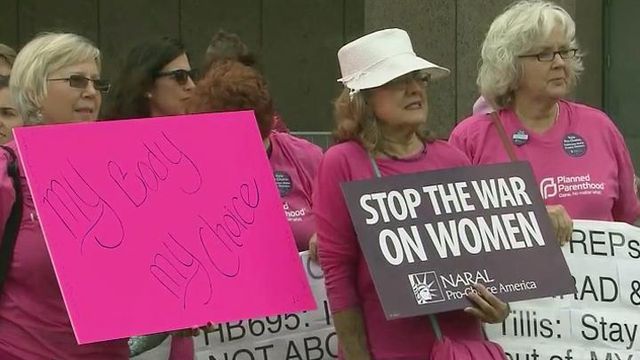House committee approves new version of abortion bill
A bill placing restrictions on abortion clinics is now attached to a measure that started as a motorcycle safety bill. The new abortion language slightly tweaks a bill sent from the Senate in order to appease the governor.
Posted — UpdatedMembers of the House Judiciary B Committee changed the bill to instruct Department of Health and Human Services regulators to write rules "not unduly restricting access" of women seeking abortion, but opponents of the bill say the change does little to alter the substance of the measure.
House leaders were critical of senators, who rewrote a House bill just before the Fourth of July to carry the abortion language, and told reporters this week they would follow a more open process. On Tuesday, they held a public hearing on the Senate measure.
But Wednesday, the House committee took a bill related to motorcycle safety, Senate Bill 353, and attached the abortion language. There was no notice that the abortion-related provisions would be on the calendar. It passed the committee on a 10-5 vote.
"We're late in the session, and this is the way you get things done late in the session sometimes," said Rep. Ruth Samuelson, R-Mecklenburg. "We wanted to make sure that we got this done and didn't leave it hanging."
Lawmakers are trying to wrap up their work for the year this month while still negotiating tax and budget bills.
But Democrats cried foul, saying House leaders were displaying the same disregard for public notice as the Senate did.
"We're as bad as the Senate is," said Rep. Mickey Michaux, D-Durham.
"This is a major policy shift, a major constitutional issue, probably the most divisive issue on the social agenda in the state of north Carolina. The process up to this point has been ludicrously not transparent," said Rep. Rick Glazier, D-Cumberland.
Republicans argue that the provisions of the bill have existed in separate pieces of legislation for months. The only thing that's different, they said, is that the measures have been combined under a single bill and attached to an unrelated piece of legislation.
Under the bill as it now exists, the measure would:
- Allow any health care provider, not just doctors and nurses, to opt out of participating in abortion procedures.
- Prohibit health plans offered on the exchange established under the federal Affordable Care Act from offering coverage for abortion.
- Prohibit cities and counties from offering coverage for abortions in health plans they offer their employees.
- Prohibit abortions for the purpose of selecting the sex of a child.
- Require physicians to be present for the entire abortion procedure, even if the doctor would not be in the room during a comparable medical procedure.
- Ask the Department of Health and Human Services to write regulations for abortion clinics similar to those for ambulatory surgery centers. Such regulations have required clinics in other states to invest hundreds of thousands of dollars in upgrades or close down. Currently, there is only one abortion clinic in the state that meets such standards.
"It's just another sneak attack. The bill's almost exactly the same," said Suzanne Buckley, executive director of NARAL Pro-Choice North Carolina. "It's just clear that they're looking to restrict access to abortion, and they don't care how they do it."
Samuelson told reporters that she and the Governor's Office had negotiated over the bill and that the changes reflected in the House draft resolve McCrory's objections. Representatives for the governor declined to comment on the bill.
McCrory had threatened to veto the Senate-passed bill unless "changes and clarifications" were made to address issues raised by DHHS Secretary Aldona Wos. She told a different House committee on Tuesday that some of the language in the Senate-passed bill was vague and that the state could do more to improve safety by funding more inspectors for health facilities of all sorts.
Samuelson and other lawmakers backing the bill said they made those changes by allowing DHHS to use standards of ambulatory surgical centers rather than require them. Also, the bill language now says the rules should achieve those standards "while not unduly restricting access."
Democrats said that language merely papered over the intent of the bill.
"This bill tramples on the rights of women for reproductive choice in the state of North Carolina," Glazier said.
Attorney General Roy Cooper, a Democrat, said he opposes the new bill, predicting that lawmakers continue to invite lawsuits over abortion restrictions.
"Even with these changes, restricting the health care rights of women is still bad public policy and will ignite more constitutional challenges in court,” Cooper said in a statement.
John Rustin, president of the North Carolina Family Policy Council, said the new measure still protects patient safety, and he's optimistic it will pass quickly.
"While we would prefer that abortions did not take place at all in our society, these are positive steps forward to protect the health and well-being of women," Rustin said.
House lawmakers could hear the measure Thursday. It would then have to return to the Senate for a final vote.
Related Topics
Copyright 2024 by Capitol Broadcasting Company. All rights reserved. This material may not be published, broadcast, rewritten or redistributed.






